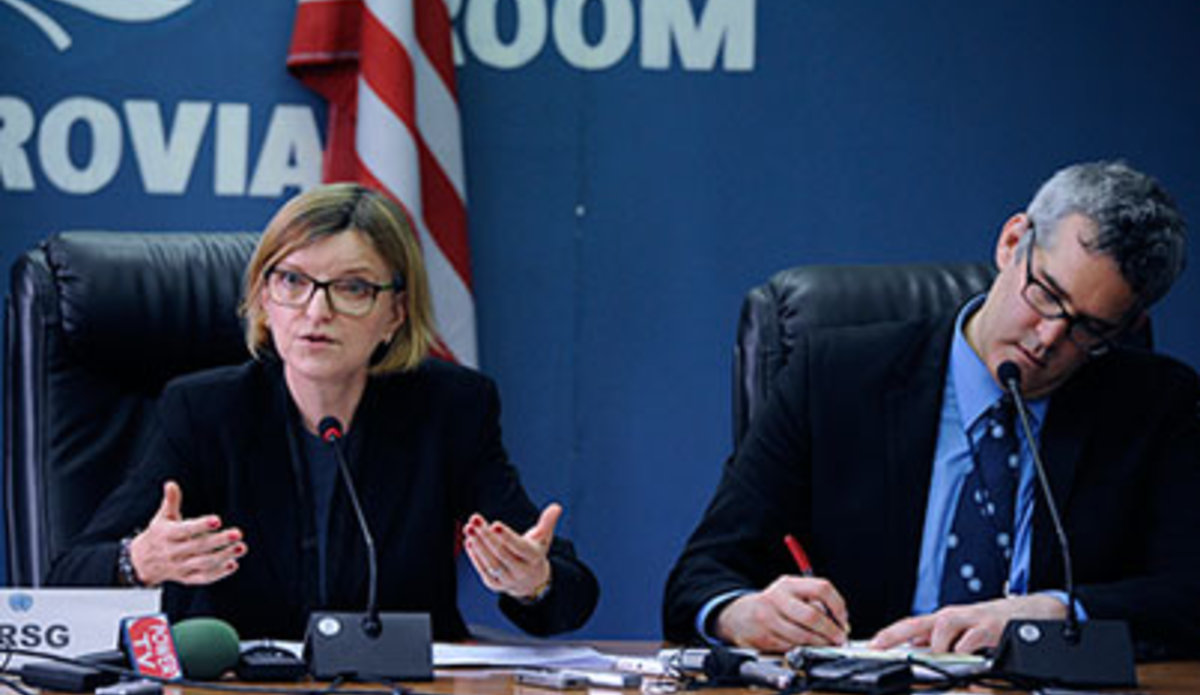Press briefing by SRSG Karin Landgren on the UN Security Council’s recent discussion on Liberia
Good morning everyone and welcome to UNMIL Headquarters.
On May 5th, I briefed the UN Security Council on the situation in Liberia. When I last briefed the Council on September 9th last year, Liberia was dealing with hundreds of new Ebola cases of every week, in an outbreak the Security Council described as a threat to international security.
This time, Liberia was on the verge of being declared Ebola-free, which happened on the 9th of May. This has been an extraordinary turnaround by Liberia in the fight against Ebola. I congratulate all Liberian people on this achievement, and until we are at zero cases in the region we must all remain vigilant. In my briefing to the Security Council on May 5th, I described Liberia’s success in beating back Ebola, the Government’s plan to assume full responsibility for Liberia’s security by June 30th, 2016, and the resumption of UNMIL’s gradual drawdown. These are all very encouraging developments. In addition, I referred to the Senatorial elections in December of last year, and the subsequent recourse to Liberia’s institutions to pursue the peaceful resolution of electoral disputes. I referred to Liberia’s historic reform, now, in deconcentrating service delivery. I also referred to the resumption of Quadripartite meetings between the governments of Liberia and Cote d’Ivoire, and the two UN Missions. In short, I was pleased to give the Security Council so much positive news. The Security Council’s decision to resume the UNMIL drawdown reflects the progress Liberia has made in 12 years of peace. The drawdown resumed on 13 May when 80 soldiers from Toe Town, Grand Gedeh County, withdrew to Tappita, Nimba County, where they were joined by additional soldiers transferred from Pleebo, Maryland County. By September 2015, the number of UNMIL military personnel will be about 3,400. The Government’s Security Plan for UNMIL Transition is linked to the UNMIL drawdown. The Security Transition Plan focuses on Liberia taking over tasks still performed by UNMIL, and it also addresses needs and capacity gaps across the security sector. I commend Liberia for meeting the Security Transition Plan’s initial benchmarks, including by ratifying the Arms Trade Treaty on 21 April and taking over responsibility for marking and registering arms. UNMIL will continue to work closely with the Liberia National Police, the Bureau of Immigration and Naturalization, the Armed Forces of Liberia, and the Ministry of Justice to strengthen capacity throughout the transition period. We anticipate that the Joint Implementation Group for this Plan will meet soon to start monitoring progress in transitioning responsibility. The Joint Implementation Group will be chaired by the Minister of Justice and the SRSG. Among the tasks that have to be handed over from UNMIL to the Government by 30 June 2016 are the destruction of explosive remnants of war, that will be transferred to the AFL, security at Liberia’s two largest prisons, which will be the responsibility of LNP and BCR, and guard duty at several locations. I am confident Liberia will be prepared to take over these tasks. The success of the Security Transition Plan depends on many things. The police need to be effective in all counties, and that also means having the trust and cooperation of the people they serve. Earlier this week I spoke to the security agencies and superintendents in Rivercess and Grand Bassa County. I was told that the LNP in Rivercess are supposed to number 162, but they are 26. They don’t have a single functioning vehicle. They were frank with me, and they were also frustrated. The Government’s security transition plan foresees historic reform in the deconcentration of service delivery. Strengthening security mechanisms in the counties is vital. The formation of County Security Councils is well underway, and will enhance the relationships between communities and Liberia’s security institutions. On my recent county visits, I also heard of the spirit and the momentum that is present after Liberia’s successful fight against Ebola. A county youth coordinator told me, “What I liked in this fight against Ebola was our togetherness.” The togetherness, and the resilience Liberians showed against Ebola will still be needed for the next set of challenges. Before I take your questions, I would like to remind everyone that next Friday, 29 May, is the International Day of United Nations Peacekeepers. I hope you will join me in recognizing the contributions to Liberia made by peacekeepers over the past 12 years of peace, including those who lost their lives while contributing their service here. I also note the recent passing of journalist Herbert Johnson and I express my condolences to his family and to the Press Union of Liberia.
Thank you. I will now take questions.
 UN
UN United Nations Peacekeeping
United Nations Peacekeeping





